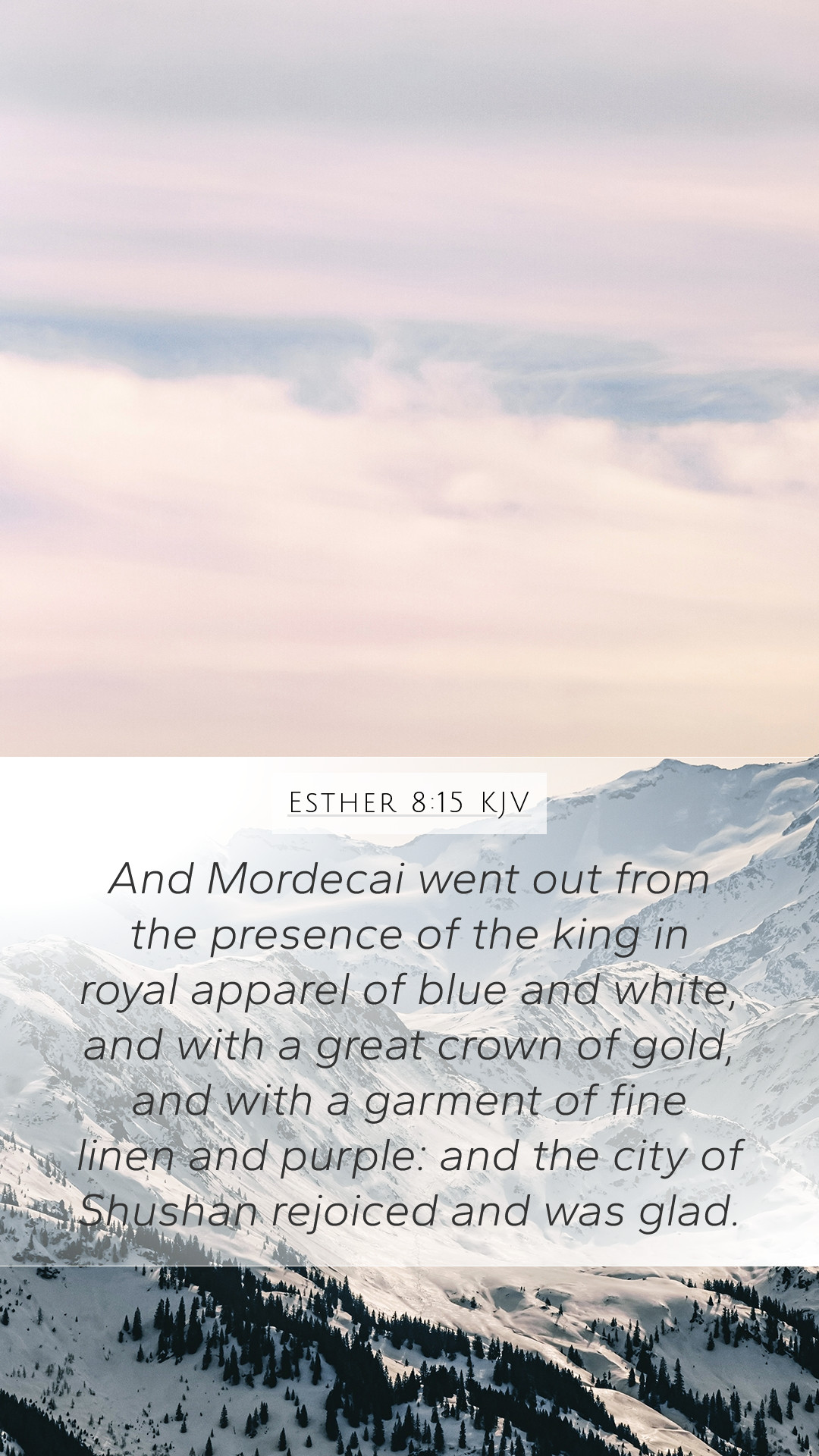Old Testament
Genesis Exodus Leviticus Numbers Deuteronomy Joshua Judges Ruth 1 Samuel 2 Samuel 1 Kings 2 Kings 1 Chronicles 2 Chronicles Ezra Nehemiah Esther Job Psalms Proverbs Ecclesiastes Song of Solomon Isaiah Jeremiah Lamentations Ezekiel Daniel Hosea Joel Amos Obadiah Jonah Micah Nahum Habakkuk Zephaniah Haggai Zechariah MalachiEsther 8:15 Meaning
What is the meaning of Esther 8:15?
And Mordecai went out from the presence of the king in royal apparel of blue and white, and with a great crown of gold, and with a garment of fine linen and purple: and the city of Shushan rejoiced and was glad.
Esther 8:15 Bible Verse Meaning
Bible Verse Meaning: Esther 8:15
Esther 8:15: "And Mordecai went out from the presence of the king in royal apparel of blue and white, and with a great crown of gold, and with a garment of fine linen and purple: and the city of Shushan rejoiced and was glad."
Summary of Esther 8:15
This verse captures a moment of profound transformation and joy. Mordecai, once a humble Jew and a servant in the king’s palace, is elevated to a position of honor after the downfall of Haman. The imagery of royal apparel symbolizes not only his newfound status but also the favor he has received from King Ahasuerus.
Insights from Commentaries
-
Matthew Henry:
Henry emphasizes that Mordecai’s elevation is a demonstration of divine providence. He notes that God often exalts the humble and fills the hungry with good things. With Mordecai honored, it signifies that righteousness will eventually prevail over evil.
-
Albert Barnes:
Barnes points to the significance of Mordecai's royal garments, indicating that they are a public recognition of his high station and the favor he commands. The transformation from mourning to celebration is pivotal, accentuating themes of victory and reward for loyalty to God.
-
Adam Clarke:
Clarke draws attention to the socio-political context of Shushan’s reaction. The joy of the city reflects not just Mordecai’s ascent, but a national relief from the imminent threat posed by Haman's previous edict. This event serves to remind readers of the interplay between divine intervention and human affairs in the course of history.
Key Themes and Interpretations
-
The Sovereignty of God:
The verse manifests God’s control over history. Despite the evil intentions of Haman, God’s plan for His people prevails, showing that He is always working for the good of those who trust in Him, aligning with the wider theme prevalent throughout the Book of Esther.
-
The Role of Esther and Mordecai:
The partnership between Esther and Mordecai emphasizes the importance of courage and faith in the face of adversity. Their actions lead to deliverance for the Jews, reinforcing the idea that God works through His people to enact His purposes.
-
Joy and Celebration:
The verse captures the essence of jubilation amidst communal distress. The happiness in Shushan represents a larger rejoicing among the Jewish people, which is a recurring theme in the scripture where deliverance brings about joy and gratitude.
Practical Applications
Understanding this verse aids in applying biblical truths to daily life:
- Trusting in God’s Plan: Just as Mordecai and Esther trusted in God, we too should embrace faith in His sovereign will amidst challenges.
- Celebrating Victories: It’s essential to recognize and rejoice in the victories in our lives, reflecting gratitude for God’s deliverance and blessings.
- Seeking Justice: Mordecai’s rise to power serves as an example of standing up against injustice and working diligently for the righting of wrongs.
Cross References
- Proverbs 11:8 - "The righteous is delivered out of trouble, and the wicked cometh in his stead."
- Psalms 30:5 - "For his anger endureth but a moment; in his favour is life: weeping may endure for a night, but joy cometh in the morning."
- Esther 3:10-11 - The decree of death posed by Haman against the Jews, illustrating the tension and subsequent deliverance.
Conclusion
Esther 8:15 encapsulates a moment of divine intervention where oppression turns to freedom, and mourning transforms into celebration. For those seeking bible verse meanings, bible verse interpretations, and bible verse understanding, this passage serves as a powerful testament to God's sovereignty and faithfulness. The insights drawn from various commentaries enrich our bible study insights and aid in bible study lessons that focus on the dynamics of faith, justice, and communal joy in the face of trials.


